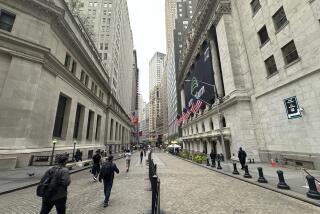Stocks Dive as Bonds Sell Off; Dow Falls 24.92 : Decline of Dollar and Program Selling Tied to Index Futures Are Cited
NEW YORK — Stock prices slumped Tuesday, hurt by a traumatic decline in the bond market, a sharp fall in the dollar’s value and profit taking by investors who are nervous about the economy.
Traders said a plunge in stock prices was intensified by big brokerage houses that use computerized buy and sell programs that are triggered when disparities occur between the price of stocks and stock index futures.
The Dow Jones average of 30 industrial stocks fell 24.92 points to 1,830.98, a day after it set a record close of 1,855.90. It was the index’s sharpest drop since April 4, when it fell 27.18. Broader measurements of the market also fell sharply.
“The market has been long overdue for some sort of a correction,” said Theodore Halligan, an analyst with the investment firm of Piper, Jaffray & Hopwood in New York.
Many analysts linked the stock market’s behavior to a big drop in bond prices, which reflects rising interest rates. The Treasury’s bellwether 30-year bond dropped $27.50 for every $1,000 in face value.
“It seems that the market, as usual, was in tandem with the fixed-income market,” said Jack Solomon, an analyst at the New York investment firm of Bear, Stearns.
Close Eye on Corporate Earnings
Others said that investors, nervous about the state of the economy, cashed in their profits on the market’s advance to record highs in the last couple of weeks, fearful that corporate earnings may not improve later this year.
A large drop in durable-goods orders in March may have exacerbated that fear, some analysts said. Ordinarily, a drop in production stimulates the stock market because it intensifies pressure for lower interest rates.
“The economy’s had 15 months of economic stimulus, and maybe it’s not working,” said Michael Metz, an analyst with the New York investment firm of Oppenheimer & Co. “Maybe people are having second thoughts. Maybe we’ve gotten to the point where bad news is bad news.”
The New York Stock Exchange composite index, which measures all listed issues, fell 1.21 to 139.86. Decliners held a five-to-three edge over gainers in active NYSE trading, led by sharp drops in blue-chip stocks, and volume totaled 161.51 million shares, compared to 136.09 million on Monday.
Declines in first-quarter earnings hurt several notable stocks, including Chrysler, which fell 1 1/2 to 39 7/8, and Sears, Roebuck, which dropped 2 5/8 to 45.
Other prominent losers spanned companies in all sectors of the economy, from manufacturing to financial services. They included Union Carbide at 23, down 1 5/8; McDonald’s at 104, down 1; Minnesota Mining at 103, down 2, Exxon at 57, down 1 3/8, and First Boston at 60 1/2, down 1 1/2.
On the gaining side, NCR rose 1 1/8 to 48 3/4 after the company introduced a new mainframe computer that won favorable industry reviews.
Sea-Land rose 2 3/8 to 28 after CSX offered to buy the container-shipping firm for $28 a share, or $742 million, exceeding a hostile offer from Dallas investor Harold Simmons.
Other notable gainers included Pacific Telesis at 100 1/2, up 1 1/8; Marriott at 168, up 2, and Borden at 63, up 1 7/8.
The bond market’s drop was the biggest one-day decline since early 1982, according to an index of Treasury bond prices maintained by the investment firm of Shearson Lehman Bros.
Elliott Platt, director of government bond research for the investment firm of Donaldson, Lufkin & Jenrette Securities, said the market opened higher as the government reported a dip in consumer prices and factory orders for durable goods in March. But the market quickly changed direction as oil futures prices rose, Platt said. In addition, he said there was concern about the slow pace of congressional action on the federal budget deficit.
The bond market’s decline accelerated in the afternoon as the dollar fell to more than four-year lows against the West German, Swiss and Dutch currencies and a post-World War II low against the Japanese yen.
More to Read
Inside the business of entertainment
The Wide Shot brings you news, analysis and insights on everything from streaming wars to production — and what it all means for the future.
You may occasionally receive promotional content from the Los Angeles Times.










